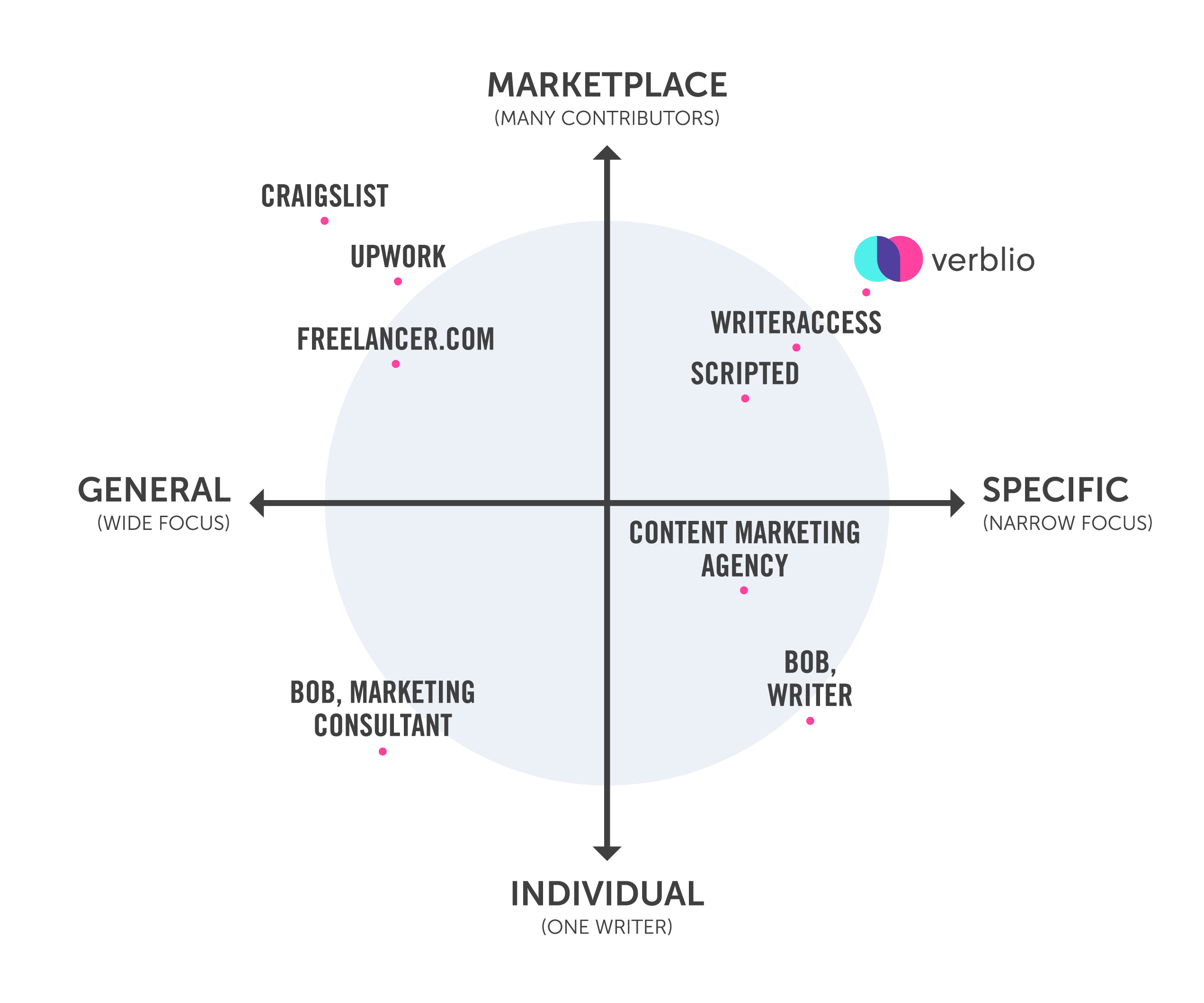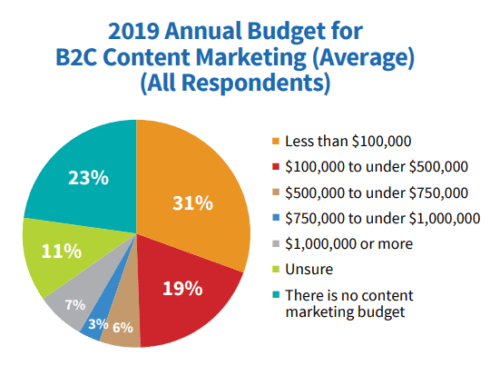Content creation is hard. According to Angela DeFranco of HubSpot: “Content creation is the hardest part of inbound marketing”. (Side note, we interviewed Angela, at the time a product manager at HubSpot working on content writing products, on topic cluster methodology. More on that here.) Because it’s hard, and because it doesn’t feel like the most urgent thing on your to do list, content creation often gets pushed back … and back.
So, I’m going to make the case that businesses should outsource content creation (or at least a chunk of it) and then dive into a quick framework for how to outsource content writing. Finally, I’ll suggest some resources for further investigation.
Here’s why you should start outsourcing (like, today):
Definitions and Questions: Content Outsourcing, Outsourced Content Writers, Oh My!
Let’s start with a couple of definitions and FAQs to make sure we’re on the same page.
What is content outsourcing?
Content outsourcing is simply the act of having someone outside of your organization create content for you, usually content to be used for content marketing and SEO. It covers everything from outsourced article writing to outsourced ebook writing to other types of content like videos and podcasts.
This is pretty broad—specifically around who you’re outsourcing too. That might be an individual freelance writer, a content writing service or platform, or an agency. Don’t worry, we’ll get into all 3 options later.
What is content development outsourcing?
Basically a fancier way of saying what I just said — development here just means developing content.
Can you outsource content marketing? Is this different than outsourcing content creation?
Phew. We could go all day on this one. The long and short of it is—there’s a lot more to content marketing than content creation. Think: content strategy, ongoing content optimization/refreshing, publishing all the content you create on your website, ensuring it makes sense as a library, creating lead magnets, offers, and internal linking to ensure the content that’s created has a logical next step in the user journey.
You get the picture.
Point is, someone needs to do all that other work. In my experience, outsourcing content creation is a lot easier than outsourcing all of content marketing. You might find an agency who’ll take on the whole deal, but they’re few and far between.
Are there content writing services? Platforms that focus on outsourced content creation?
You bet.
We’re one of them. Our list, so we get to go first. Rest are in no particular order, but here’s a list of top content writing services.
- Verblio
- Crowd Content
- Writer Access
- iWriter
- Contently
- BKA Content
- Text Broker
- Scripted
You’ll also find content writers on more generalized platforms for online work like Upwork and Fiverr. More on how we think we compare here.
How to Outsource Content Writing
Outsourcing content creation is a big topic. In fact, we wrote a whole e-book about it if you want to go deep. But what I’m going to do here is:
- Outline a basic framework that’ll help you get a great start,
- Provide additional resources when you’re ready to go deeper, and
- Suggest a shortcut.
A Five-Step Framework on How to Outsource Content Creation
Here’s a five-step framework for outsourcing your content creation, based on everything I’ve learned over the past 12 years of creating content, testing hundreds of different writers, various platforms, and building internal teams.
Step 1: Assess your needs and budget.
There are so many ways to find the optimal freelancer to write for your business, and every price range to match.
Depending on what you need, how fast you need it, and how much expertise you require, you’ll find that the hiring spectrum of content writers runs the gamut along two major axes:
- General to Specific — How diverse is the focus of your writer? Do they have a niche, or are they a generalist?
- Marketplace to Individual — Does your writer offer their service as part of a larger platform, or do they work directly with your company?
And there are a vast amount of services (yes, including ours!) that fall into these categories:

That’s why you need to start with your budget in mind.
Starting with a budget in mind will help you understand which options are viable for you and which aren’t. While an individual who specializes in your industry may create top-notch content, you might not be able to afford them.
Legal content writers are a great example of this, as as to outsource article writing to a high-end writer with legal expertise often costs more than $1.00 per word. That’s a minimum of $1,000 for a 1,000 word article, which is about half the length you need for best-practice SEO in the legal space. You’re shelling out big bucks for something that may not even help you.
The good news is that you probably won’t have writer fees that steep in most industries—but they can still drain you if you’re not careful.
The annual report by Content Marketing Institute can be a helpful barometer for the overall content industry. Part of that publication is a section on budgets, and a lot of businesses are spending more than $100,000 per year on their content marketing in both B2B and B2C marketing:

Of course, if you’re not planning on spending that much on your content this year, these numbers are only marginally useful. You ultimately need to know your business’s limits, what your competition is up to, and your industry norms as you go to make an outsourcing decision.
Step 2: Pick someplace(s) to start
Ok. Time to dive in.
My guidance: start somewhere that’s low-friction to get started. You’ll learn a lot by doing and trying. Expect you may need to test multiple places, and certainly multiple writers to find your groove.
We wrote in-depth about how to find freelance writers here.
Step 3: Test out working with your outsourcer(s)
Testing an outsourcer means setting aside a test project to actually get a feel for the way your outsourcer does business, in a far more telling way than just looking at samples from a writer’s portfolio or past work. This is how we at Verblio vet all of our potential writers to test working dynamics, finished product, editing rounds, etc.
The process you should use to test is fairly simple:
- Create a valuable topic (or topics) that require the writer to showcase industry knowledge and researching ability.
- Set and communicate a reasonable timeline.
- Agree to pay the writer a fair rate.
- Provide detailed feedback to the writer on the first draft.
- Provide additional feedback through extra drafts, if necessary.
- Assess the quality of the piece along all iterations (first draft and edited drafts).
- Decide whether to hire or pass.
- Pay the writer. (Please pay the writer either way!)
It’s very similar to hiring for any other position, only you’re looking for all of the elements I highlighted above. Any good outsourced content writer will solicit regular feedback and open communication lines along the way, and will deliver timely, polished work.
And don’t limit yourself to just one—testing a couple of writers will give you a feel for what’s possible, what you like, and what you don’t.
But with this process, there are a few temptations to shortcut. I know time is of the essence with all things business, but I encourage you to avoid these particular “shortcuts”:
- The desire to test a writer on a piece that you’d never publish
- The desire to rely on samples alone
- The desire to find someone who’s almost there
Let’s talk about why.
WHY YOU SHOULD TEST ON A PIECE YOU’LL PUBLISH:
If you try to assess your outsourcer’s ability on a low-value, low-stakes piece, there’s a good chance that you won’t assess it with the same degree of thoroughness you would on a piece that represents your brand. So low-stakes pieces aren’t exactly a great way to assess whether a writer can deliver on a high-stakes piece of content.
In other words, you’ll be shorting yourself with this shortcut.
Of course, that brings up the question of “well, what if the writer is a dud and I wasted my time and money on a piece that I wish I could publish?” A fair question—but it doesn’t change my answer.
Let’s explore a few scenarios that may play out here.
In the first, you create a high-stakes piece with a writer that delivers. Congrats, your topic selection paid off.
In the second, you still get a piece of content, but it wasn’t quite what you needed. Chances are if the writer had enough credibility to pass your initial vetting, they produced a piece of content that can be salvaged by either you or a different writer. You’ve paid for the piece, and you can have it edited into something better. Still a win.
But what if it’s a complete dud? Well, congrats—you learned how to better assess writers in the future, and you spent money dodging a bullet.
So at the end of the day, this point is fairly simple. Test with pieces you care about!
WHY YOU SHOULDN’T JUST RELY ON SAMPLES:
Let’s talk samples. There are some just okay writers out there with outstanding samples.
The key to understanding this point is somewhat embedded in the content creation outsourcing industry. The best agencies (that you’d want to see samples from) have a fairly intensive process, and the writer is just one cog of that machine. Behind the scenes, that writer may also be getting feedback from an army of individuals:
- An account manager
- A copy editor
- A subject-matter expert internal staff member
- The stakeholder (final publisher or client)
- Anyone else involved in the creation and quality assurance process
Meaning the writer themselves may not be the reason a final draft is so polished.
So that really impressive sample may only be impressive because they had a top-end editor helping, or because the piece they created was heavily edited.
Point is, you just don’t know until you test them yourself—so take those samples with a grain of salt.
WHY ALMOST ISN’T GOOD ENOUGH… MOST OF THE TIME
But what if the writer is just below what you might feel is the acceptable threshold for your brand? For instance, they created an okay draft, took your feedback well, but still came up a bit short.
Should you hire them and try to “invest” in their development? Or should you pass on them in favor of a more qualified writer?
The answer here depends.
Again, most people outsource content creation because they don’t have the time (or they need an expert head to give fresh ideas). If you’re hiring for either of these reasons, they’re valid reasons to avoid this shortcut.
Step 4: Break out your content needs into buckets and scale
At this point, you’ve figured out your budget and found a writer. Now it’s time to dig deep into strategy so you can get the best bang for your buck.
The key here is to stick to fundamentals.
When you’re generating content that fall into “needs” versus “wants”, start by breaking everything into stages: top-of-funnel, middle-of-funnel, and bottom-of-funnel.
Or in other words, map out where in your funnel you need content the most, and then consider how you want to outsource content creation for it.
As a general rule, we’ve found it’s easier to outsource content at the top/middle of the funnel than the bottom. At the bottom, it’s harder and more time-intensive to convey all the nuance of your business.
This is where you can ask yourself some key questions:
- What would you be comfortable outsourcing with minimal oversight?
- How does your outsourcing solution specifically fit into your content strategy?
- Is the outsourcer you’ve found qualified to help you with these needs?
- Is your content casting a wide enough net through each stage of the funnel?
These questions will help you assess whether you’re on the right track with your content creation outsourcing solution. Vary your approach as needed so you get the right balance between volume and quality.
Just as an example, here’s how Verblio handles our own internal content. A lot of our top-of-funnel content is outsourced to writers on the Verblio platform. Our middle-of-funnel content goes to a much more selective pool of freelance writers (sourced from the Verblio pool, by the way), and we keep our bottom-of-funnel or “big content” pieces in-house with our content marketing team, which has a ton of content writing or subject-matter experience.
This allows us to prioritize (and pay for) our content as needed, and it lets us effectively create content that casts a wider net.
And that brings up my other point here: scaling.
As you design your outsourcing strategy, account for scale and volume increasing as you execute on a more robust content marketing strategy. We talked about budgeting earlier, and this is where that prep work helps you outsource content marketing with the best results. You can also take the lessons you’ve learned vetting writers to find more and more outsourcers to help.At this point, you’re well on your way past learning how to outsource content writing—but you’re not quite done! There’s one more piece I’d recommend you consider as you dial in your content outsourcing.
Step 5: Arm your outsourcer with all they need to know about writing for your company
The final key when talking how to outsourcing blog writing (or anything content creation) is to equip your writer(s) with the materials they need to deliver.
This includes outlines, applicable resources that you trust in your industry for solid, trustworthy information, all the way to a style guide of what you expect from content (including elements like tone, linking preferences, grammar usage, and much more!).
We try to address this early on with our own clients:
We wrote more about this concept here, but here’s a hint: over-communicate at the beginning. This will feel time intensive, but will pay dividends as you build relationships with your freelancers over time and save you headaches and money down the road.
Additional Resources For Outsourcing Content Creation
Here are a few additional resources if you’re ready to learn more about how to outsource content creation.
- Our e-book, How to Hire Freelance Writers That Magnify Your Inbound Marketing Results, dives deep into how to find, onboard, and work with freelance writers for inbound marketing.
- Case studies on how our most successful clients made outsourced content creation successful with Verblio.
- Three ways to attract the top freelance writers on the Verblio platform
- 7 secrets for creating an outsourced content team [from HubSpot]
- For agencies, two resources: a case study on how a leading SEO agency outsourced content creation with Verblio, and a HubSpot agency building their agency’s own offerings on top of content created by Verblio writers.
A Shortcut
[If you clicked the anchor link to get here, you definitely need a shortcut!]
When I write content for our own content marketing, I try very hard to make sure it’s not too self-serving and is useful to folks whether or not they become a Verblio customer. I hope you found this blog post no exception.
But, time for a quick plug about Verblio, because if you’re looking for a shortcut for how to outsource your content writing, we’re worth a look—we’ve spent the last 12 years building a product designed to do exactly that. You can learn more about how Verblio works here.
PS – Why You Should Outsource Content Marketing
Note: If you’re convinced you should outsource content writing, you can skip this section. If you just read the last 3,000 words or so and are currently thinking, “wow this is going to be a lot of work”, time for a pep talk.
The biggest stumbling block I hear from folks thinking about outsourcing content marketing efforts is something to the effect of “Content is personal. No one else can tell my story like I can.”
I hear this a lot, as I run marketing for Verblio. We’re an outsourced content creation platform.
While that could bias me, I’ll still do my best to present a measured argument and make this article useful regardless of how you choose to outsource your content creation or content marketing.
So here’s what I have to share:
This ‘no one can write content like me’ stumbling block has a lot of merit. Content is deeply personal, and finding someone else who can help you capture your story isn’t easy.
Yet most of the prospects and customers I’ve talked to have decided to outsource content creation in spite of the above. (Or they’ve realized this isn’t as impossible as it sounds, more on that in the “how” section below.)
Here’s why:
- They’ve come to the realization they simply don’t have time to create their own content (or all of it).
- They’ve realized that writing (or at least writing well and/or quickly) isn’t their strong suit, or their time is just better spent elsewhere.
Once you’ve come to one of these realizations, or a similar one, a big part of the why behind why you should outsource content becomes a lot easier, and the logic goes like this:
- I believe content marketing will be helpful for my business.
- I want to do content marketing, but I don’t have time / I tried to but I couldn’t make the time, do the writing, etc.
- The only way for me to do content marketing is to outsource the work (or some of it).
OK, so we’ve established one big part of the why.
But there’s another big part, and it’s the same reason you’d consider outsourcing any aspect of your business. The same reason you try to bring talented people of any kind onto your team:
Outsourcing content marketing can bring a unique, expert skill set and new, powerful ideas to the table.
Whether you’re outsourcing your accounting function, your facilities management, or your content marketing, your goal should be the same. You need to find experts who will inject new, progressive ideas you haven’t thought of into your organization, and help you better execute on those ideas by delegating.
While there are other plentiful reasons you should outsource your content marketing, I’m going to call these the big two:
- Increase your bandwidth, and ensure content marketing gets done
- Bring experts with new, big ideas onto your team.
Now that we’ve established the why, let’s talk how.
In Conclusion
Hopefully, if you’ve gotten this far, you now understand some of the benefits of outsourcing. And, hopefully, you know more about how to outsource your content writing and the whole process feels a little more within reach than it did at the start of this article.
To leave you with two final thoughts:
- Patience is necessary in outsourcing of any kind. Don’t expect to see immediate time savings, and don’t expect to get it perfect the very first time.
- Because of #1, choose an outsourcing partner that enables excellent communication with your writer(s), and allows you to test a variety of writers so you can find the subject matter expertise and the voice, tone, and writing style that’s a great fit for your business.
Still have questions I didn’t answer? Happy to try and answer them.
Editor’s note: This blog post was originally published on February 21, 2018, and has been updated several times to reflect current best practices and information for 2022.



